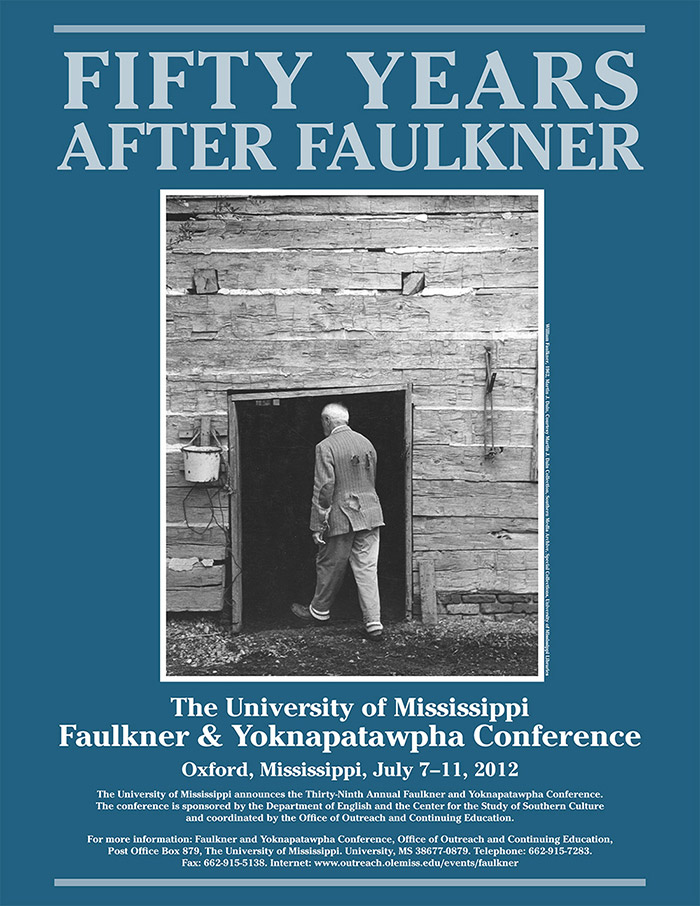
Panel. Reappraising The Reivers at Fifty
Location
Nutt Auditorium
Start Date
10-7-2012 11:00 AM
Description
- Faulkner’s Memphis in the Civil Rights Era: Reminiscence and Resistance in The Reivers (1962) / Cheryl Lester, University of Kansas
The Reivers presents Memphis not as a mid-20th-century metropolis about to explode under the mounting pressures of the Civil Rights Movement, but as the turn-of-the-century backdrop of a boyhood adventure and rite of passage. Nonetheless, it offers steady yet understated resistance to inequality and discrimination by commenting on their inscription in the organization of space, interactions among people, and modes of transportation. Furthermore, by casting itself as an interpersonal communication between grandfather and grandson, it suggests that, for all the material transformations that separate the 1961 scene of reminiscing from the 1905 setting of the reminiscence, the social inequalities that are remarked throughout the rural and urban landscape of the South remain conventional and familiar to both grandson and grandfather. - Looking Backward at Social Change in The Reivers / Richard Moreland, Louisiana State University
The Reivers is framed as a grandfather's reflection on a formative boyhood experience of personal and social change. The novel also frames and repeatedly invokes Faulkner's own earlier literary reflections on change. His last novel considers several ways in which a society's more or less unspoken "gentlemen's agreements" can be stretched, broken, reevaluated, and rearticulated. Possible explanations for such changes include supernatural factors, heroism, large natural and social forces, individual maneuvering, and mutually influential examples of creativity and responsibility. - You can't know. You’re the wrong color: Faulkner’s Copernican revolution in The Reivers / François Pitavy, Université de Bourgogne
In 1961, at a critical juncture in the history of race relations in the South, William Faulkner’s last novel goes far beyond his « Go slow » advice to the Black leaders. In The Reivers, the center of vision is a black man, Ned—the trickster or the fool telling the truth, as in Shakespeare. Ned restates the essence of Americanness at its inception and makes explicit the theme of color-blindness running through the novel, by claiming the precedence of the people before the Law, and then by nullifying the color-barrier when he tells the white aristocrat that he is the wrong color : a Copernican revolution going back to the origins of the American nation.
Relational Format
Conference proceeding
Recommended Citation
Lester, Cheryl; Moreland, Richard; and Pitavy, François, "Panel. Reappraising The Reivers at Fifty" (2012). Faulkner and Yoknapatawpha Conference. 37.
https://egrove.olemiss.edu/fy/2012/schedule/37
COinS
Jul 10th, 11:00 AM
Panel. Reappraising The Reivers at Fifty
Nutt Auditorium
- Faulkner’s Memphis in the Civil Rights Era: Reminiscence and Resistance in The Reivers (1962) / Cheryl Lester, University of Kansas
The Reivers presents Memphis not as a mid-20th-century metropolis about to explode under the mounting pressures of the Civil Rights Movement, but as the turn-of-the-century backdrop of a boyhood adventure and rite of passage. Nonetheless, it offers steady yet understated resistance to inequality and discrimination by commenting on their inscription in the organization of space, interactions among people, and modes of transportation. Furthermore, by casting itself as an interpersonal communication between grandfather and grandson, it suggests that, for all the material transformations that separate the 1961 scene of reminiscing from the 1905 setting of the reminiscence, the social inequalities that are remarked throughout the rural and urban landscape of the South remain conventional and familiar to both grandson and grandfather. - Looking Backward at Social Change in The Reivers / Richard Moreland, Louisiana State University
The Reivers is framed as a grandfather's reflection on a formative boyhood experience of personal and social change. The novel also frames and repeatedly invokes Faulkner's own earlier literary reflections on change. His last novel considers several ways in which a society's more or less unspoken "gentlemen's agreements" can be stretched, broken, reevaluated, and rearticulated. Possible explanations for such changes include supernatural factors, heroism, large natural and social forces, individual maneuvering, and mutually influential examples of creativity and responsibility. - You can't know. You’re the wrong color: Faulkner’s Copernican revolution in The Reivers / François Pitavy, Université de Bourgogne
In 1961, at a critical juncture in the history of race relations in the South, William Faulkner’s last novel goes far beyond his « Go slow » advice to the Black leaders. In The Reivers, the center of vision is a black man, Ned—the trickster or the fool telling the truth, as in Shakespeare. Ned restates the essence of Americanness at its inception and makes explicit the theme of color-blindness running through the novel, by claiming the precedence of the people before the Law, and then by nullifying the color-barrier when he tells the white aristocrat that he is the wrong color : a Copernican revolution going back to the origins of the American nation.

